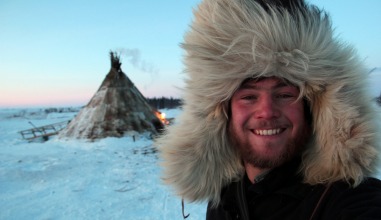Season 2 Episode 15

Alex Reich ’11 joins us on this episode of the podcast to discuss his time at Grinnell, his Watson Fellowship journey, and the dangers of black and white thinking, especially in relation to our global food systems.
Reich visited Grinnell in the fall for the Center for Prairie Studies’ Local Foods Symposium, giving a talk titled, “The Whole World is a Farm: Individual Stewardship Amidst a Global Challenge.”
Titular Head to Youtube
As a student at Grinnell, Reich majored in biology, helped start EcoHouse, ran cross country and track, and even starred in Star Wars Grinnell, the 2009 winner of the student film festival, Titular Head.
Nowadays, he’s probably better known as one of the creators of MinuteEarth, an immensely popular YouTube channel featuring short videos dedicated to the “science and stories about our awesome planet.” Reich created the series along with his brother, fellow Grinnellian Henry Reich ’09 (who has a similarly popular series, MinutePhysics). Alex has worked on other related projects, including the new show, Hot Mess, a PBS series “about how climate change impacts all of us, and about how we can create a better future for our planet and ourselves.” Through these stories and educational videos, Reich works to raise awareness and educate people about the intricately linked issues of climate change and the global food system.
Watch: Alex’s MinuteEarth videos on YouTube
A New Relationship to Food

Reich wasn’t always so keenly interested in the world of food, though. Growing up, he ate food, as most people do, and his family occasionally grew a garden, but he didn’t think too deeply about his relationship with what he ate. But after graduating high school early, he went to New Zealand to backpack in the mountains and conduct field research about the carbon dynamics of forests. It was there, in New Zealand, that Reich started to learn about different ways of relating to food.
The people working on the field experiments had a farmhouse where Reich stayed, with goats and a huge garden, from which they ate. Reich grew interested in this different relationship to food consumption:
“The way that we eat is a big interaction point for us and the rest of the world...and that we can act intentionally around it, whether that’s growing our own or whether it’s buying in a certain way, that struck me as something that I just had not really ever thought that deeply about.”

So when he ended up at Grinnell his first year, Reich quickly sought out the student groups and community focused around food and the environment.
During his time at Grinnell, Reich ran track and cross country and helped start the off-campus project house Eco House. He was involved in various environmental programs and initiatives at Grinnell, including a Davis Peace Project, “Local Foods for Local People.” As a student, Reich says he “focused more on food and sort of traditional environmentalism.” Since graduating, he has sharpened his focus on climate, and he says, “It was really my Watson fellowship that led me to think more about the connection between food and climate.”
Reflections and Resilience From the Watson Fellowship

After graduating from Grinnell with a biology major and tons of big questions, Reich set out for a year in the Arctic on a Watson Fellowship, learning how indigenous peoples are adapting their systems of agriculture to the rapidly changing climate. This yearlong fellowship was an opportunity for Reich to apply his burgeoning interest in the systems surrounding food and their impact on people and the planet.
For Reich, the Watson Fellowship enabled him to step outside the obligations and expectations of “what our culture or our family or our institutions or our society as a whole tell us is what we should do.” Even at Grinnell, where Reich says “the students and the institution itself are trying to be a little bit different than the rest of the world,” he found himself swept up in the culture of being busy. His Watson year encouraged him to slow down and reflect in an intentional way.

He left his Watson journey with a great deal of personal reflection, as well as stories of resilience from the people he met: “It is our capacity to change and deal effectively with [climate change] that helps us survive and thrive and you don’t necessarily need fancy technology or other things like that in order to succeed. You just need knowledge and you need a willingness to do it. And that comes from lots of different places around the world is something that we need to remember.”
Thinking Differently
The Watson year afforded Reich the opportunity to think differently about the world – something he also found at Grinnell, and something he thinks the world could use a little more of, he says.
“One thing I personally miss being out in the big wide world and that is so refreshing whenever I come back here is that there’s a lot more possibility about what people can be when you’re in a place that says, ‘try being who you want to be’ rather than ‘you are this’ or ‘you are that.’ Whether or not that’s uniquely unique to Grinnell, it is here and that's great.”
Reich says that while his inquisitive nature and interest in sustainable agriculture were both qualities he had long before he became a Grinnellian, Grinnell provided him with a space wherein he was encouraged to be himself, to be different, to pursue his genuine interests, and to ask the hard questions and he’s been seeking out impactful ways to do just that ever since. Reich continues to advocate for and seek out alternative solutions to the biggest problems we face as a global community.

